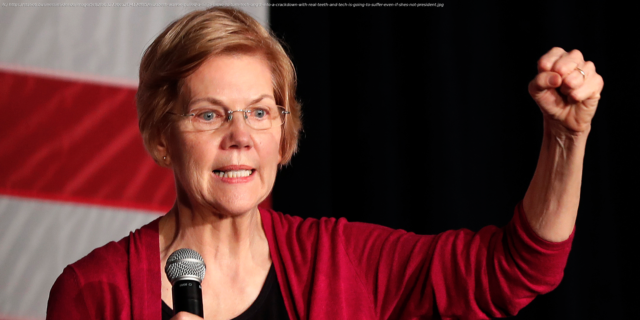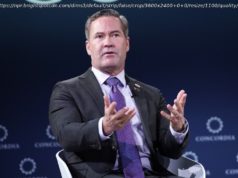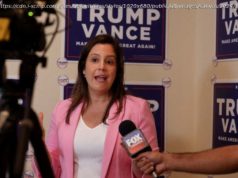It’s been a long time since antitrust policy has been a major topic of a presidential election. Elizabeth Warren is trying change that —…
It’s been a long time since antitrust policy has been a major topic of a presidential election.
Elizabeth Warren is trying change that — and it’s bad news for Amazon, Facebook, and Google parent Alphabet.
Warren declared Friday that if she’s elected president, one of her centerpiece policies will be to break up those three big-tech firms. She wants to unwind their past mergers and split up other parts of their business to rein in their power and increase competition.
Right now, Warren’s still a long shot to secure the Democratic Party nomination, much less win the 2020 election, so the tech firms aren’t in immediate danger. But Jeff Bezos, Mark Zuckerberg, and Larry Page would be foolish to dismiss the threat she just unleashed.
Warren is tapping into public angst about tech’s influence on our lives and channeling it into a legal mechanism that, however rusted it’s become over the years, has the capacity to subjugate even the most powerful businesses.
With a two-year election cycle just getting started, the tech industry is now officially America’s number one corporate villain — more dangerous than Wall Street bankers or Martin Shkreli — and the debate is now focused on real reforms centered on legitimate antitrust policy rather than mere populist rage.
That’s bad news for Big Tech. Even if she’s not elected president, Warren’s move has increased the chance that the rulers of the tech universe are going to draw damaging fire, no matter who is. Warren wants to shine a spotlight on the big tech companies
The tech industry has really never faced this kind of scrutiny. Yes, certain companies in the industry have faced antitrust actions, including Microsoft in the famous trial at the turn of the last century. And some of those actions, including the Microsoft trial and the AT&T breakup of the 1980s drew widespread public attention.
But discussion over what to do about those companies’ conduct was generally left up to the courts or federal agencies. It wasn’t a big topic of debate in a presidential election. In 2000, for example, George W. Bush said little about the then-ongoing Microsoft trial, and it was an open question when he took office how his administration would approach the case. When his Justice Department agreed to a settlement that stopped short of breaking up the company, the decision came as something of a surprise.
Warren’s doesn’t want antitrust policy to be ignored this time around. Instead, she wants antitrust policy to be in the spotlight, and she wants a public debate about how these big tech companies should be regulated. If she succeeds, it would be one of the first times that corporate concentration of power has been a major election issue since the Progressive Era of the early 1900s.
Home
United States
USA — Political Elizabeth Warren pulled a ninja move to turn tech angst into a...






